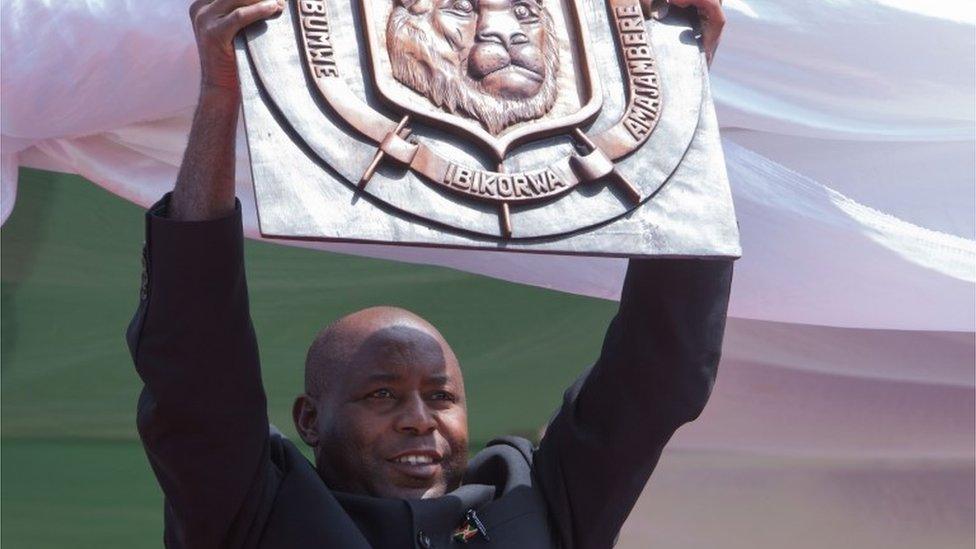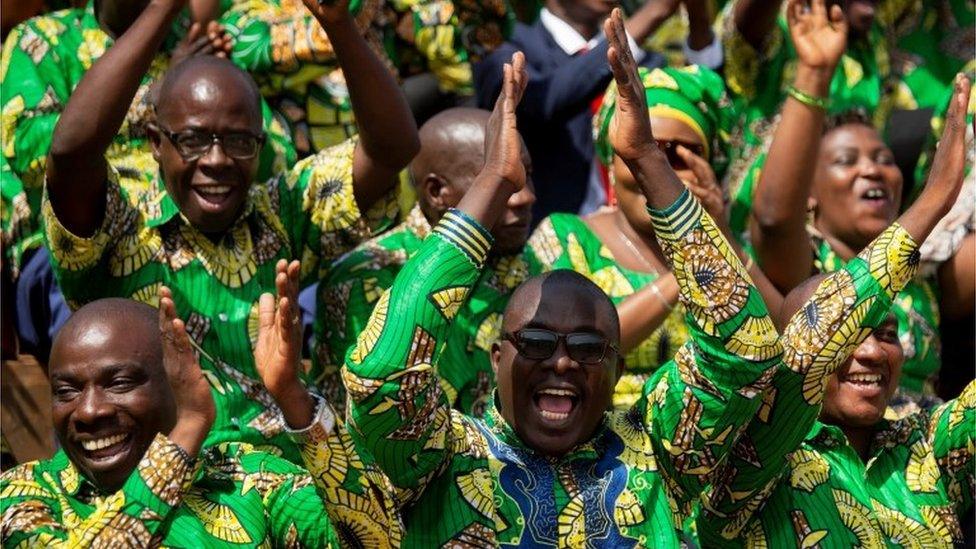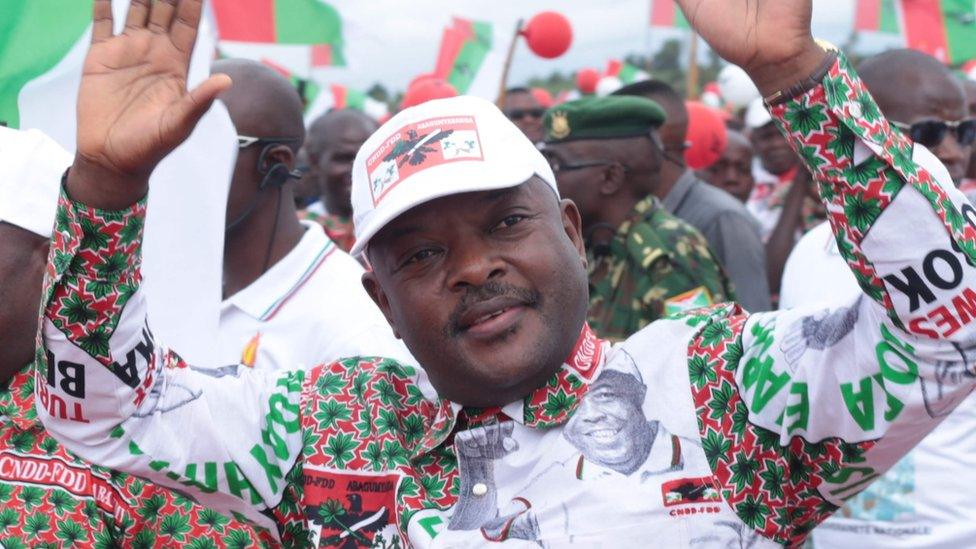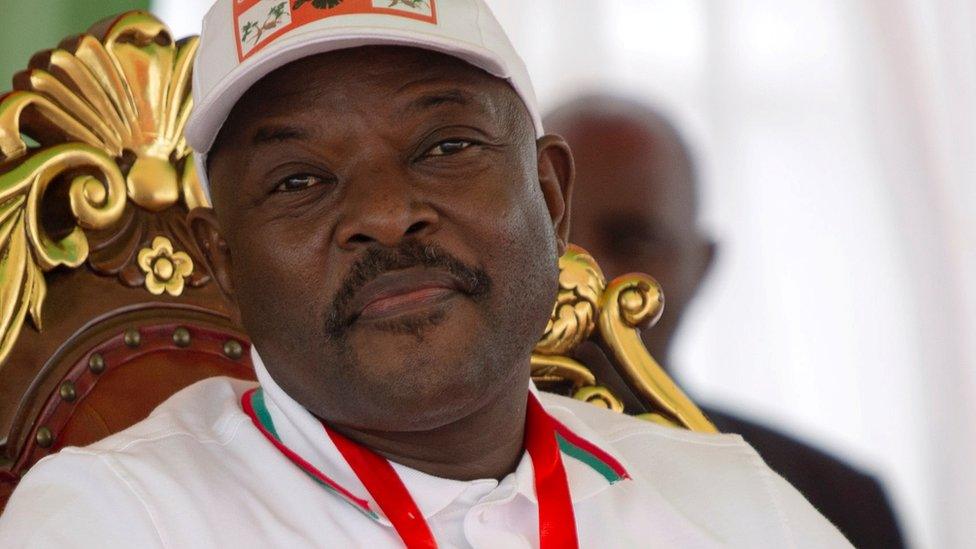Burundi’s Evariste Ndayishimiye is sworn in as president
- Published

Evariste Ndayishimiye held up the plate of the national symbol during his swearing-in ceremony
Burundi's newly elected president, Evariste Ndayishimiye, has been sworn in two months earlier than planned.
No foreign heads of state were present when he took the oath of office in the administrative capital, Gitega, where he pledged to defend the nation's interests and unify its citizens.
The fast-tracked ceremony comes after his predecessor Pierre Nkurunziza died suddenly last week.
Mr Ndayishimiye is a former rebel leader, like Mr Nkurunziza.
He was backed by his predecessor and was declared the winner of May's presidential election, which the opposition said was rigged.
Mr Nkurunziza died aged 55 on 8 June after suffering a cardiac arrest, the government said. There are unconfirmed reports that he was suffering from Covid-19.
After 15 years in power, Mr Nkurunziza was due to step down in August.
'Fighting genocide'
People attending the inauguration were told to arrive early to allow time for temperature checks and other coronavirus measures - but once in the stadium there was no social distancing
"I will not fail the unity charter, the constitution and other laws, will uphold unity among Burundians, peace and justice for all, [and] fight the ideology of genocide and discrimination," Mr Ndayishimiye said while taking his oath, reports the Reuters news agency.

There was no social distancing inside the stadium
According to Burundi's constitution, if the head of state dies in office then the president of the national assembly, currently Pascal Nyabenda, should succeed him.
But after a ruling by Burundi's Constitutional Court, Mr Ndayishimiye's inauguration in Gitega was brought forward.

Who is Evariste Ndayishimiye?
By Cyuzuzo Samba, BBC Great Lakes
The 52-year-old army general is regarded as a "humble" and "religious" man.
He has been among the most influential generals since 2005, when his close friend and colleague in rebellion, Pierre Nkurunziza took power.
Mr Ndayishimiye, commonly known as "Neva", was a law student in the University of Burundi when the civil war erupted in 1993 following the assassination of President Melchior Ndadaye.
Like his predecessor Mr Nkurunziza, in 1995, Mr Ndayishimiye survived an attack on ethnic Hutu students at his campus in the then-capital Bujumbura.
He then fled the country and joined the rebel force that was formed to fight the then Tutsi-led government.
Mr Ndayishimiye worked closely with Mr Nkurunziza during the Arusha peace talks between the government and the FDD rebels.
Following the 2003 peace accord that saw FDD rebels share the power with the government, Mr Ndayishimiye deputised for the then army chief of Burundi.
In 2006 he was named minister of the interior, before becoming the president's military adviser and then secretary-general of the ruling CNDD-FDD party.
Mr Ndayishimiye, a father of six, is known as a practising Roman Catholic, and like his predecessor emphasises the role of God in politics.

The new president is taking over a country that is diplomatically isolated and on bad terms with donors.
In 2015, the constitution was changed, allowing Mr Nkurunziza to seek a third term, triggering huge protests, an attempted coup and a widespread crackdown.
Thousands of Burundians have fled the country and into refugee camps in neighbouring countries.
Inside Burundi's secret killing house
Correction 19 June 2020: This story has been amended to remove an erroneous reference to President Ndayishimiye warning that opposition parties would not be tolerated.
- Published19 May 2020

- Published9 June 2020
